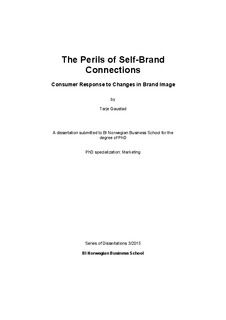| dc.description.abstract | Companies commit considerable resources to build brand associations that resonate with consumers’ identities and facilitate strong consumer-brand bonds. This dissertation investigated a potential disadvantage of this popular strategy; specifically, how changes in brand image (e.g., due to brand acquisitions or repositioning) can decrease consumer identification with the brand.
Across five studies, this dissertation investigated consumer response to changes that incorporated new associations in brand image (Studies 1-3), and changes that reinforced existing salient brand associations (Studies 4-5). The results from the three first studies show that high degree self-brand connection consumers responded negatively to changes that incorporated new associations in brand image. This finding contrasts with existing research, which has consistently found that brand connections serve as a buffer against transgressions and negative brand information.
Counterintuitively, the results from the two last studies show that even changes that intensify salient brand associations can decrease consumer brand identification in some instances, depending on what part of the self the brand is connected to. When brand connection was based on ideal self-brand congruity (i.e., self-enhancement motives), the reinforcement of existing associations increased the brand’s ability to signal an ideal identity, and, thus, the brand’s efficacy as an instrument for self-enhancement increased. However, when the brand connection was based on actual self-brand congruity (i.e., self-verification motives), changes in brand image reduced felt similarity between the actual self and the brand, such that the brand’s efficacy as an instrument for self-verification decreased.
This dissertation contributes to the literature by providing a different perspective on brand connections. While the extant research focuses primarily on the formation of strong consumer-brand bonds and the positive consequences of these bonds, current research demonstrates conditions under which companies may experience negative consequences of self-brand connections. Also, the current research demonstrates that consumers’ reactions to changes in brand image depend on how strongly connected they feel to the brand and whether the connection is related primarily to their actual or ideal selves. This dissertation highlights a caveat for managers who try to balance the cultivation of consumer-brand bonds while also responding to market dynamics and growth opportunities. | nb_NO |
